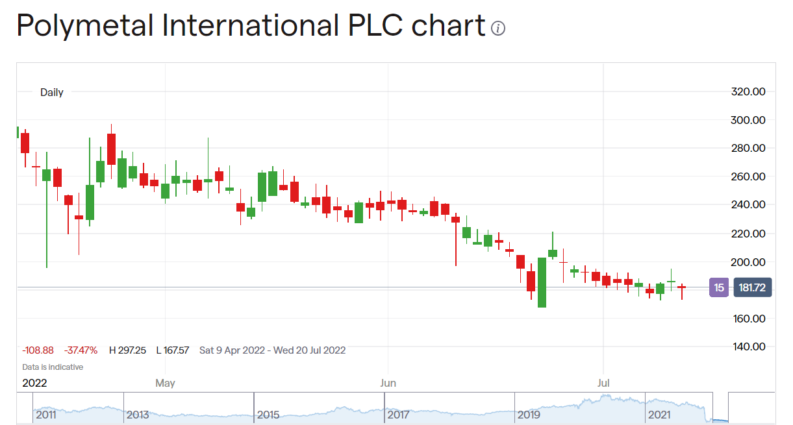Key points:
- Niether Eurasia Mining nor Polymetal are directly or indirectly sanctioned
- The administration of Petropavlovsk does, though, raise risks
- Even if by error sanctions push a company into administration they will not be changed
It's possible that both Polymetal (LON: POLY) and Eurasia Mining (LON: EUA) shares will be hit by the fallout from the administration of Petropavlovsk (LON: POG) which was announced this morning. Niether Polymetal nor Eurasia are sanctioned, no parts of their business are under any special restrictions, the directors and major shareholders are not. Yet all of this was true of Petropavlovsk and that company, POG, was still driven into administration by the sanctions.
The point to grasp here is that these events have raised the risks on any Russia related shares. It's now obvious that sanctions which have unintended effects will not be changed, nor will there be variances in the rules to allow workarounds from those undesired and unmeant effects. The rules are those rules and fall foul of them and there will be no intervention.
Just to remind what happened to Petropavlovsk. The company was not sanctioned, gold mining is not, but the company's bank, Gazprombank was. POG financed working capital with a loan from Gazprombank plus an agreement to sell gold through the bank. Future gold was the security for the working capital loan that is – a fairly common arrangement. Then come sanctions. Petropavlovsk cannot deliver gold to Gazprombank, that breaches sanctions. Even if it could find a refinancing it cannot pay off the bank because that breaches sanctions. So, the bank can call in the loan and put POG into administration. Effectively, what has happened.

It's important to grasp that neither Polymetal nor Eurasia Mining have hostages to fortune like that relationship with Gazprombank. The businesses, people, directors, other shareholders, just are not sanctioned entities – nor are the banks they use.
However, it's also worth noting that the two ADR programs for Polymetal – AUCOY and POYYF – have recently been stopped even though there are no sanctions issues. The penumbra of the sanctions seems to be reaching rather further than it, strictly speaking, should.
The important lesson here though is that risk just rose at all Russian related firms. Sanctions risk that is. Even when – inadvertently we might say – the sanctions put a perfectly legal and non-sanctioned company into administration then the risks are greater and wider than we might at first have thought. For there was a simple enough way for the rule makers to allow Petropavlovsk to continue. Just say ah, yes, that's not quite what we meant and allow them to continue to deliver gold to their bankers. But note what didn't happen – that didn't happen.
That is, even if sanctions drive the entirely blameless bust those sanctions rules are not going to be changed. Which is an increase in risk for all Russia related companies.
Again, note, there are no sanctions issues currenlty with Eurasia Mining or Polymetal. The risk is that if, inadvertently, they get caught in some expansion or change in them then given current evidence there are not going to be variances allowed. That's a rise in risk.
